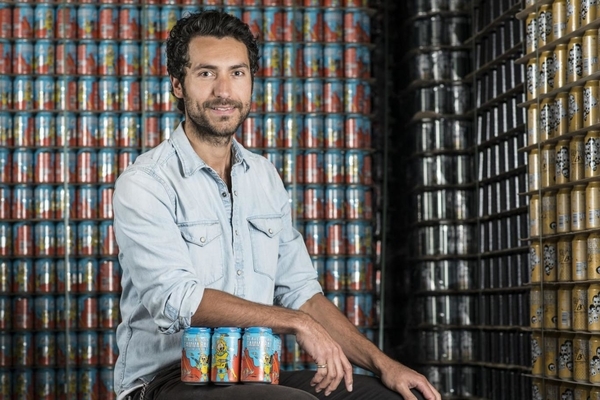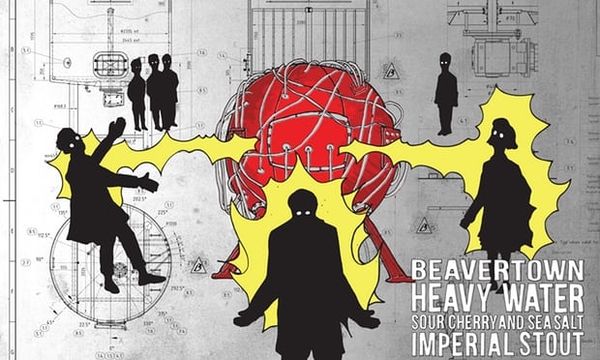Big Beer moves in on Beavertown
Added: Saturday, June 23rd 2018

Big Beer is on the march. Heineken, one of the world’s brewing goliaths, has invested £40 million in the North London craft brewery Beavertown in return for an undisclosed share of the company, thought to be in the region of 49 per cent.
The reaction has been mixed. BrewDog, perhaps predictably, has declared it won’t stock Beavertown beers in its pubs and a few other craft brewers with pubs have followed suit.
But on Twitter several people have said they see nothing wrong with the deal and suggest it will enable Beavertown to build a bigger brewery and gain more market share.
It’s true that founder Logan Plant will be able to build a new brewery in Tottenham with a capacity of 450,000 hectolitres, making it a substantial producer. But will there be a price to pay and could Beavertown eventually lose its independence? The omens are not good. In the United States, Heineken bought a 49 per cent stake in the California brewery Lagunitas and within a few years that has grown to complete ownership.
Big Beer, in the shape of AB InBev, Carlsberg, Heineken and Molson Coors, are snapping up small craft breweries not only because the craft sector is growing fast but also because sales of mainstream lagers are plummeting in traditional markets. As a result, AB InBev has bought a raft of breweries, including 10 Barrel, Blue Point, Breckenridge, Devils Backbone, Elysian, Four Peaks, Golden Road, Goose Island and Shock Top. Miller Coors, now wholly owned by Coors, has taken Blue Moon, Leinenkugel’s and Saint Archer under its wings.
The Anchor Brewery in San Francisco that was central to the American beer revival with its iconic Steam Beer, has been sold to Sapporo of Japan for $85m.
In Britain, Heineken owns the substantial Caledonian Brewery in Edinburgh where the main beer is the national brand Deuchar’s IPA, and now has a large stake in Beavertown. It also has a 49 per cent stake in the Brixton Brewery. Carlsberg has bought the London Fields brewery while AB InBev paid £80m for Camden Town.
The biggest acquisition to date was Meantime in Greenwich, which was bought by SABMiller in 2016 for a staggering £120m. When SABMiller was bought by AB InBev for £71 billion, the third biggest corporate takeover in history, AB InBev was forced to relinquish some of its brands to meet the demands of both U.S. and EU regulators concerned with market domination. As a result, Meantime passed to Asahi of Japan.
The scene was set for Big Beer to snaffle up successful smaller brewers back in 2011 when Molson Coors, based in the former Bass breweries in Burton-on-Trent, bought Sharp’s in Cornwall. £7.5m has been invested in Sharp’s where production has increased from 60,000 barrels a year to 200,000 and Doom Bar has been turned into the biggest-selling cask and bottled beer in the UK.
To those who say they are not worried by this state of affairs, I would point to two key concerns: economies of scale and beer quality.
Professor John Colley of Warwick University has made a study of the way in which global corporations operate and snuff out competition. He says the global brewers’ ability to dominate markets is a result of producing cheaper products. Big brewers enjoy 40 per cent lower costs than smaller ones and there’s even a huge difference between the big and medium size brewers as the global producers are able to buy raw materials, such as grain and hops, in vast bulk and can drive down the prices suppliers charge. The result is lower costs and lower prices.
Professor Colley says that when AB InBev bought Modelo in Mexico it stripped 20 per cent of costs out of the company. With Beck’s in Germay it took out 15 per cent of costs. He estimates that the merger with SABMiller will generate cost savings of $1.4 billion, which amounts to 70 per cent of revenue.

Low production costs enable the giant brewers to promote their beers on TV, poster sites and social media at prices smaller brewers cannot match. Most important, these economies of scale enable the giant brewers to undercut the competition.
Walk down the beer isles of most supermarkets and you will find that the likes of Camden Town, Goose Island and Lagunitas retail at around £1.85 a bottle. Smaller breweries can’t afford the discounts demanded by supermarkets and would fail to make a living if they sold beer for £1.85. There are also “special offers”, with some beers sold for £1, others with three for the price of two deals. Specialist shops that concentrate on beers from craft brewers have prices in the £3 range.
Beer quality will vary depending on the owner. I’m not aware of any diminution to date in the quality of Meantime beers in the hands of Asahi. Heineken has been a benign influence at Caledonian where it has invested in a pilot brewery where new beers are trialled and the product range has been widened. In my view, Deuchar’s IPA is a shadow of the beer that won CAMRA’s Champion Beer of Britain award in 2004 but the decline set in long before Heineken arrived.
Doom Bar has changed in the hands of Molson Coors. The taste of beer is subjective but most people who appreciate quality would avoid the current incarnation of the beer. And despite claims to its Cornish origin on labels, the bottled version is now brewed in Burton, a fair step from the Cornish Riviera.
All beers change over time. Hops and grains used 20 or more years ago may have been phased out. The danger where the global brewers are concerned is more to do with accountants and marketing departments that are driven by maximising profit. In their hands, cheaper ingredients may be introduced and production speeded up. Where lager beer is concerned, 21-day production cycles are universal among the globals. As a Carlsberg brewer in Copenhagen has declared: “We have taken the lagering out of lager”.
In the U.S., Goose Island that started life as a brewpub in Chicago run by John Hall and his son Gregg was bought by Anheuser Busch, the American arm of AB InBev. The main beers – IPA, Honkers Ale and 312 Urban Wheat – are now brewed at a Budweiser plant in Fort Collins, Colorado, at two Labatts breweries in Canada owned by the giant and what it calls a new “facility” on the East Coast of the U.S. Goose Island IPA was, in my view, one of the finest of the new breed of the style. Today I would call it a pleasant beer but not outstanding. A different yeast culture, which plays a vital role in beer flavour, has been changed to enable the beer to be fermented in conical vessels.
The original recipe, given to me by the Halls, included Czech Saaz hops. They have been phased out as a result of Anheuser Busch’s long-running dispute with the Czech brewers of Budweiser Budvar. AB InBev vehemently denies that Saaz hops were ever used in Goose Island but I prefer to rely on the information supplied by the brewery when it was independent. The beer is now called simply Goose IPA.
It’s difficult if not impossible for consumers to stop takeovers and mergers. But we can strike a blow for quality and craftsmanship by drinking beer made by artisans who are as enthused by quality and taste as they are by making money. The Brewers’ Association in the U.S. and SIBA, the Society of Independent Brewers, in the UK, help by awarding an American Seal of Approval and a British Assured Independent label to their members’ beers. Watch out for them.
Logan Plant remains as chief executive at Beavertown. Gamma Ray, Neck Oil, Bloody ‘Ell and other beers will no doubt remain quality brews. But he is now working hand-in-glove with a giant global brewer whose desire to cut costs can have only one result: to squeeze genuine small craft brewers out of the market.





